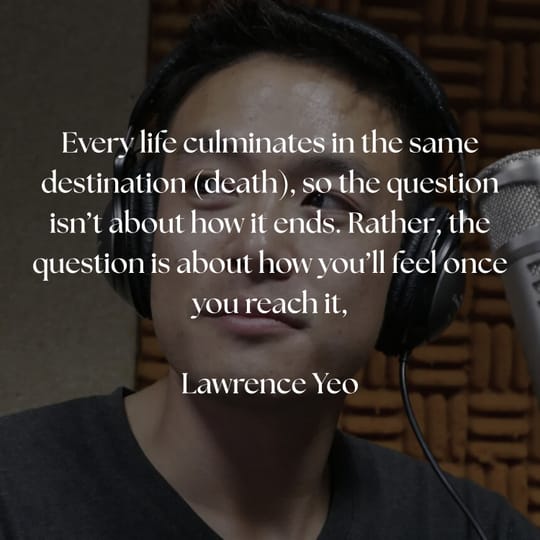
Your Inner Compass
Being 71, and getting closer and closer to our ultimate human destination - death - I have thought quite a bit about the issue of how I will feel when that time arrives. Actually, I will feel pretty damn good, thanks to the difficult (hellish) period of my life that led me to wake up to what is, to me, most important:
- To be connected to the people in my life who matter most: my family. But this is not some lip service quip like "my family is the most important thing to me," and then always prioritizing work or other activities like I used to.
- To spend my days doing something that reflects my Inner Compass (one part of which is this newsletter), which I thankfully found before it was all too late.
My lack of a clear Inner Compass and lack of real connections with my family and others were the roots of the malaise and burnout I was feeling before I ended up in Hazelden.
The Inner Compass is a remarkable short book written by Lawrence Yeo that I highly recommend for everyone. Highly, highly recommended, especially for young people trying to get some traction on figuring out who they are inside and how to leverage their hidden superpowers. A caveat: back in the day, when I was my Version 1 self, pre-Hazelden, I suspect I would have written the book off as too ethereal and even woo-woo. That would have been a misguided, uninformed, and ignorant assessment.
On the topic of connection and relationships, I came across this excellent article on connection that I recommend giving a read. However, I am quoting the section of the article on One to One Connection (bolded parts are mine):
"In a world filled with followers, contacts, and colleagues, what many of us lack are real, consistent, one-on-one relationships — the kind that sustain us through change, challenge, and everyday life.
Our Chief Friendship Officer, Shasta Nelson, has spent over a decade studying what makes close friendships thrive. She’s found that three ingredients are essential: consistency, positivity, and vulnerability. Without regular time together, shared enjoyment, and honest emotional exchange, relationships struggle to grow.
Research backs this up. It takes about six meaningful interactions with someone to start feeling connected — and roughly 200 hours to form a true best friend (Hall, 2018, Journal of Social and Personal Relationships).
Yet in our busy, fragmented lives, many of us aren’t even meeting the minimum. According to the American Time Use Survey, nearly 40% of U.S. adults spend no time with friends in a typical day (U.S. Bureau of Labor Statistics, 2022). And Cigna’s national survey on loneliness found that people who see friends or family at least 2–3 times per week report significantly lower levels of loneliness and greater emotional health.
This kind of connection doesn’t require dozens of people. It starts by intentionally investing in just one or two relationships each week. That might mean setting a recurring walk with a friend, a monthly lunch, or simply being the one who reaches out.
These one-on-one bonds are the bedrock of resilience. They anchor us emotionally, create mutual trust, and give us someone to celebrate with — or lean on. You don’t need a huge network. You need a few people who truly know you, and who you consistently choose to know in return."
As someone who always feels the pull of getting shit done and being productive, I can slip into a slow spiral of disconnection by letting things with others wither, unless I am intentional about it.
If you remember nothing else, remember this: Three ingredients are essential: consistency, positivity, and vulnerability. Without regular time together, shared enjoyment, and honest emotional exchange, relationships struggle to grow.
So if you are feeling disconnected from someone, and want to improve the connection, make the time, find things to talk about or to do that you will enjoy together, and talk about shit that matters.
Or, answer email instead.
